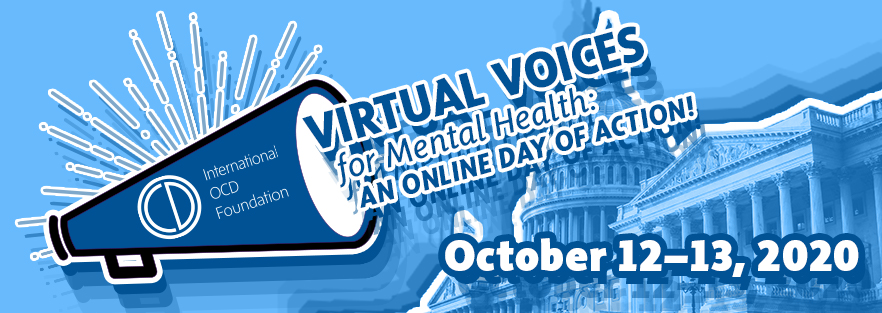Thank you for your interest in advocating with the IOCDF! On October 13th, we will advocate for the legislation below through the Day of Action Email Campaign. Registered participants will receive three emailed Action Alerts on October 13th prompting them to contact their Senators or Representative through our Action Center. For each action alert, you will enter your zip code, customize an email template, and send your message. Not available at the times listed below? No problem. You can visit the Action Center at any time throughout the week to send your messages.
All times US Eastern
10:00AM — Action Alert #1: Support Key Telehealth Legislation in the US Senate
Telehealth has been widely adopted during the pandemic to help slow the spread of COVID-19. Telehealth also has great potential to expand access to mental health treatment in areas of the country where there are few providers, or where long distances mean that patients have to travel many hours for an in-person appointment. These bills would increase access to telehealth for people who need mental health treatment.
S. 4421 — The TREAT Act (Temporary Reciprocity to Ensure Access to Treatment Act)
The TREAT Act would temporarily allow licensed clinicians to treat patients across state lines via telehealth regardless of whether or not they have a license in the state where the patient lives. This bill would expand the reach of the existing mental health workforce to undeserved areas of the US, and ensure that patient-provider relationships are not disrupted by the COVID-19 pandemic.
S. 3792 — Tele-Mental Health Improvement Act
This bill would require many private insurance plans to treat mental health and addiction services delivered via telehealth the same as those delivered in-person. For example, if this bill were passed, insurers would be barred from paying lower rates for these services, or requiring additional prior-authorization above and beyond what they require for in-person care. These protections would last for the duration of the COVID-19 public health emergency.
S. 4211 — Facilitating Reforms that Offer Necessary Telehealth In Every Rural (FRONTIER) Community Act
Medicare previously placed limits on telehealth access, but many of these rules have been relaxed during the COVID-19 pandemic to make it easier for Medicare beneficiaries to receive healthcare services at home. The FRONTIER Community Act would permanently extend flexible telehealth rules for Medicare beneficiaries in frontier states (Nevada, South Dakota, North Dakota, Wyoming, Montana, and Alaska), and do the same for telehealth delivered by the Indian Health Service. It would also create a new grant program to improve broadband infrastructure, a key need in rural areas of the country where a lack of high speed internet access is a significant barrier to some telehealth services.
1:00PM — Action Alert #2: Support the EDOT Act
H.R. 7078 — Evaluating Disparities and Outcomes of Telehealth During the COVID-19 Emergency Act of 2020 or the EDOT Act of 2020
If passed, the EDOT act would provide important data about how Medicare beneficiaries are utilizing telehealth services, and where disparities might exist along lines of race, geographic region, or income level. The reports required by this act would provide policy makers and the public with an accounting of who has access to telehealth during the pandemic, and importantly, who does not.
3:30PM — Action Alert #3: Advocate for Key Mental Health Workforce Bills in the US House of Representatives
Access to mental health treatment depends upon the mental health workforce. These bills support the clinicians who provide critical services to people in need throughout the US.
H.R. 945 — Mental Health Access Improvement Act
Across the country, Licensed Marriage and Family Therapists (LMFTs) and Licensed Mental Health Counselors (LMHCs) provide mental health treatment in their communities. These clinicians are among those whom the IOCDF trains to deliver specialized treatment for OCD (CBT with ERP). However, Medicare does not cover mental health care delivered by clinicians with these licenses. This bill would remove this barrier and include LMFTs and LMHCs in the Medicare program.
H.R. 2431 — Mental Health Professionals Workforce Shortage Loan Repayment Act of 2019
Many areas of the United States have fewer than one mental health clinician per 30,000 residents. Up to 7,500 of those residents may experience a mental illness over the next 12 months, but many will have few options and face long waiting lists. This bill creates a student loan repayment program for clinicians who choose to practice in the areas of the US with the most critical shortages of mental health workers.

